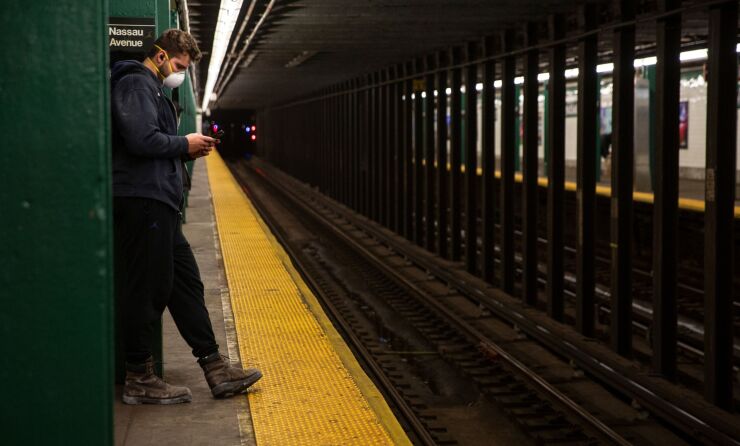The suggestion that the Metropolitan Transportation Authority sell tax-free municipal bonds in smaller denominations akin to what New York did in the 1970s is "a very interesting idea," Chairman Patrick Foye said Wednesday.
"It’s one that we’re looking at," Foye said during a teleconference sponsored by the business group Association for a Better New York, responding to a question from

In the 1970s, with the city shut off from the credit markets and on the verge of bankruptcy, the state created the Municipal Assistance Corp. to issue debt on its behalf. MAC sold bonds in denominations of $1,000 and issued $10 billion overall before its dissolution in September 2008, when all the debt was paid.
Today it's the MTA facing a fiscal crisis amid a pandemic that has chased away most of its riders and the farebox revenue they generate.
“Since low interest is the case now, what if we went for a low-denomination, tax-free MTA bond?" Moss asked. “I think you could capture enormous goodwill across the city and state if you gave every rider, every commuter a chance to invest in the MTA and get a good coupon, far better than you can get at JPMorgan Chase, for example.”
NYU Rudin is finalizing a report suggesting the MTA issue tax-free bonds in denominations of $2,500 or $5,000 to help raise needed revenue.
"The riders as well as the investment bankers on Park Avenue deserve to benefit from the MTA's financing in the next five years. Let every New Yorker, not just the wealthy, earn 5% tax-free interest on their savings," Moss said.
The state-run MTA operates the mass transit system in metropolitan New York and is one of the largest municipal bond issuers with roughly $45 billion of debt including special credits.
During the COVID-19 pandemic, ridership is down 92% on its subways and similarly for its buses and commuter rail lines.
In addition, the need for massive cleaning and disinfecting its system, and related overtime, will add "hundreds of millions" to operating costs, Foye added. The MTA this week began its first planned shutdown of subway service in its 115 years, closing the system from 1 to 5 a.m. the past two nights for cleaning.
A report by consulting firm
According to Foye, 109 employees have died from the virus as of Wednesday.

"Obviously the MAC experience is well-known to Bob [Foran] and to me and to Janno [Lieber] and others," Foye said. "That is also on the table and could be part of a portfolio of ideas put together. Everything is on the table."
Foran and Lieber are the MTA's chief financial officer and capital construction chief, respectively.
As a tradeoff for the MAC bailout, the city has had to balance its budget, use generally accepted accounting principles and prepare five-year spending plans. It submits its budgets to a separate agency, the New York State Financial Control Board.
Moody’s Investors Service, S&P Global Ratings and Fitch Ratings have downgraded the MTA’s transportation revenue bonds, its main borrowing vehicle. Kroll Bond Rating Agency placed the MTA's credits on watch for a downgrade. Moody’s rates the bonds A2 while Fitch and S&P rate them A-plus and A-minus, respectively. Kroll assigns its AA-plus rating.
Also on Tuesday, the MTA's anticipated $700 million pricing was upsized to $1.125 billion and completed at spreads about 300 basis points north of AAA benchmark yields.
"The MTA is too important to the New York State and U.S. economies for the state to let fail," Municipal Market Analytics said in a commentary.
According to data on the Municipal Securities Rulemaking Board's
Foye said the next federal rescue round is the most essential short-term need.
"That will eliminate significant pressure not only on our operating budget, but the capital program as well," he said.





